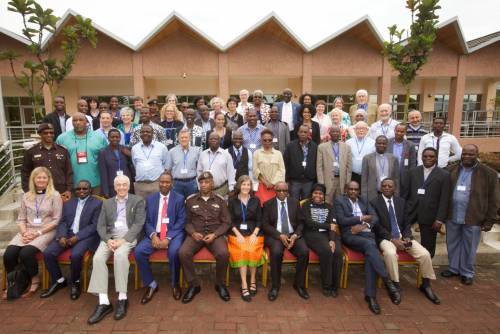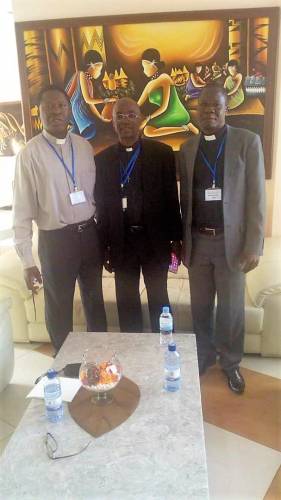A Letter from Jeremy and Luta Garbat-Welch, serving in Malawi
October 2018
Write: Jeremy Garbat-Welch
Write: Luta Garbat-Welch
Individuals: Give online to E200515 for Jeremy and Luta Garbat-Welch’s sending and support
Congregations: Give to D507577 for Jeremy and Luta Garbat-Welch’s sending and support
Churches are asked to send donations through your congregation’s normal receiving site (this is usually your presbytery)
When I first heard the call to be a chaplain, I assumed that meant learning counseling, helping people and providing comfort during times of crisis and illness, and teaching other pastors how to do likewise. What I didn’t expect was how often I was called by nurses to distract a family member who was irritating them. I was with one such family member during my second Clinical Pastoral Education (CPE) residency. I was sitting with a mother in the hall as she shared with me a lot of her anger about her daughter’s life and health situations. As I had been taught to do, I wondered if that anger might be an expression of frustration and disappointment with God, and I asked her that. She gave me a glare and said, “I’m not stupid. You don’t get angry with the pilot.” Being theologically trained, and having read the Bible a few times, it occurred to me to point out scripture where people had expressed anger and frustration with God and lived to tell about it. But instead, I said something profound like, “Oh, I see. That makes sense.” And I exercised some silence. This was apparently the right thing to say, because I was one of the few people she didn’t yell at or tell to get lost.
She taught me something that I try to remember, something that expanded my view of pastoral care. Sometimes people don’t need their theology corrected or explored, even by an “expert.” They need to be listened to by someone who cares enough not to argue with them.
We recently returned to Malawi after spending the summer months in the USA, visiting supporting congregations and sharing about the ministry of the chaplains of the Church of Central Africa Presbyterian (CCAP). One of the aspects we highlighted was how the chaplains are working to expand the typical approaches to ministries in the churches. I think chaplain ministries are often viewed as an “outreach” ministry, because the chaplain works outside the walls of the church. Therefore, the chaplain is assumed to be in a position to do evangelism and outreach to unchurched people. However, the chaplain’s role is to provide spiritual care to Christians and non-Christians alike. And chaplains focus on providing spiritual support to people that meets them in their time of need. This means engaging the spirituality that brings comfort to the person right now, not focusing on a personal agenda of evangelism during a time of crisis. One chaplain I worked under put it this way: “When the hurricane hits is not the time to paint and remodel the house — it’s time to lock down and weather the storm. Paint and remodeling and repairs can happen after.”

Official photo from the International CURE 2018 gathering in Kigali, Rwanda. Photo by Alan Pogue.
The chaplains are not only ministering to people in need in hospitals, prisons, and schools, but they are also coordinating with congregations that are doing ministry in these places and teaching them about other ways to reach out and show the love of God in these settings.
In May, the CCAP prison chaplains had an opportunity to travel to Rwanda to learn more about prison ministries. The 8th International Conference on Human Rights and Prison Reform sponsored by International CURE (Citizens United for Rehabilitation of Errants) and Good News of Peace and Development for Rwanda (GNPDR) was held in Kigali, Rwanda, at the end of May. The PC(USA) and PC Canada gave funds to send the three full-time CCAP prison chaplains, as well as some of the lay ministers in Blantyre Synod. This was a great opportunity for them to learn about prison ministry in an international context, to make connections, and also to learn about things that can be advocated for in order to improve the Malawi prison system. The prison system suffers greatly from overcrowding, resulting in a lack of resources and poor health conditions, among other things. Further, a number of prisoners are incarcerated for a long time before their case is even heard.

The CCAP Prison chaplains, from left: Rev. Stanley Chimesya (Blantyre Synod), Rev. Mathero Msatithe (Blantyre Synod), and Rev. Wickliff Zulu (Nkhoma Synod).
The conference discussed issues of justice and reform and how prisons could work differently, and included visits to Rwandan prisons. It also discussed the local restorative justice method of the Grass Courts in which airing grievances in a community gathering forum promotes social healing and restores harmony in the community.
From this experience, the CCAP chaplains expanded their views of their ministries. They saw that the role of prison chaplains can be not only one of direct ministry and support to inmates, but also one of advocacy. The church has the opportunity to speak prophetically to our governments, to encourage justice that is fair, equitable, and effective. The church has the opportunity to be an example of how to implement restorative justice, to heal communities, and bring people back to a place of healing. This can be done not only through counseling, but also through advocacy for social change.
I am excited to be back in Malawi reconnecting with the chaplains and the work they are doing. I am excited to journey with them as they not only bring immediate spiritual support and healing to people, but also do what they can to change the systems that cause the wounds in the first place.
While our time in the USA was definitely an exhausting whirlwind of visits and travel, we enjoyed connecting with so many of you! For those of you we missed, we hope to catch you the next time we are there in a few years. Our visits were great reminders of where our support comes from: We appreciate your ongoing financial gifts that allow us to serve alongside the CCAP in Malawi. Seeing you also reminded us of all the prayers that sustain us while we are here.
In Christ’s Service,
Jeremy (for the Garbat-Welches)
Please read this important message from José Luis Casal, Director, Presbyterian World Mission
Dear partners in God’s mission,
We near the close of 2018 inspired by the hope of Christ. God is transforming the world, and you are helping to make it happen.
Thank you very much for your support of our mission co-workers. The prayers and financial gifts of people like you enable them to work alongside global partners to address poverty, hopelessness, violence and other pressing problems in the name of Jesus Christ.
Every day, Presbyterian Church (U.S.A.) mission co-workers are blessed to be able to walk alongside their brothers and sisters across the globe. Listening to each other in faith and in friendship, they learn from each other how to work towards a world in which everyone flourishes. Acting upon what they discover together, PC(USA) mission co-workers and our global partners strengthen the body of Christ.
Because you are an integral part of God’s mission, I invite you to become more deeply committed to Presbyterian World Mission. First, would you make a year-end gift for the sending and support of our mission co-workers? The needs in the world are great, and World Mission is poised to answer God’s call to serve others.
I also invite you to ask your session to add our mission co-workers to your congregation’s prayer list and mission budget for 2019 and beyond. Your multi-year commitment will make a great difference in our involvement with our partners. The majority of our mission co-workers’ funding comes from the special gifts of individuals and congregations like yours, for God’s mission is a responsibility of the whole church, not a particular area of the church. Now more than ever, we need your financial support!
In faith, our mission co-workers accept a call to mission service. In faith, World Mission, representing the whole church and you, sends them to work with our global partners. In faith, will you also commit to support this work with your prayers and financial gifts? With hope and faith, I await your positive response!
At God’s service and at your service!
José Luis Casal
Director
P.S. Your gift will help meet critical needs of our global partners. Thank you!
![]() You may freely reuse and distribute this article in its entirety for non-commercial purposes in any medium. Please include author attribution, photography credits, and a link to the original article. This work is licensed under a Creative Commons Attribution-NonCommercial-NoDeratives 4.0 International License.
You may freely reuse and distribute this article in its entirety for non-commercial purposes in any medium. Please include author attribution, photography credits, and a link to the original article. This work is licensed under a Creative Commons Attribution-NonCommercial-NoDeratives 4.0 International License.